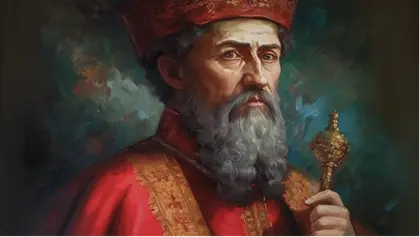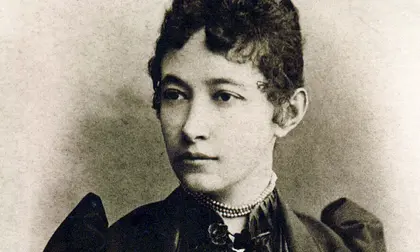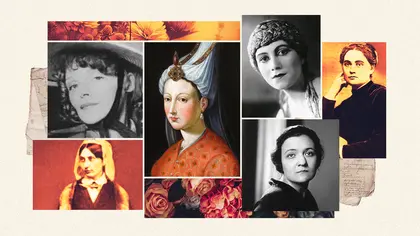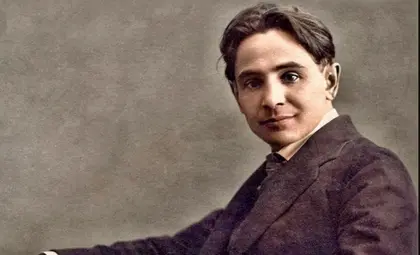The great Ukrainian writer Ivan Franko called her “Primavera” (spring). Her name is Ulyana Kravchenko, and she was born in spring – on April 18, 1860. It was Easter and later she would say it was a divine sign that predestined her to be refined, romantic and idealistic. “I would like to leave behind a faithful imprint of the soul’s life, its gentle feelings and its patience, shocks and storms... I would like to know the imprint of the soul,” she wrote in her diary.
Ulyana Kravchenko was born Julia Schneider in the township of Mykolayiv, Lviv region, which then belonged to the Austro-Hungarian Empire. Her father, Julius Schneider, was German and her mother Ukrainian. Interestingly and paradoxically, her German father taught her the Ukrainian language and demanded her perfect command of it. He was engaged in social activities and his poems (written in Ukrainian) were published in the popular literary magazine Zorya (Star). He did his best for his daughter to grow in the environment and atmosphere of Ukrainian culture, and she always remembered it with gratitude. Well-read in works by great German philosophers, Julius Schneider told his daughter, “Try to be an idealist! Try to look for the ideal in everything!”
JOIN US ON TELEGRAM
Follow our coverage of the war on the @Kyivpost_official.
When she was 10, her father died and she lived in the home of her mother’s brother, Omelyan Lopushansky, who was a prosecuting attorney. Again paradoxically, her Ukrainian uncle was a thorough Russophile. He only spoke Russian and demanded the same from his niece. He even forbade her to read Ukrainian authors.

Sahaidachny: Ukrainian Leader Whose Cossacks Saved Europe From Ottomans
Ulyana’s mother, the daughter of a Greek Catholic priest, knew a great number of Ukrainian and Polish songs, fairytales and legends, and taught them to her daughter secretly from her rich, influential and despotic brother.
When the time came for the teenage girl to choose her path in life, she did not hesitate to become a teacher. She felt that her vocation was to share her knowledge with others. So, she went to a teacher seminary in Lviv. There, she decided to change her first name to its Ukrainian variant, Ulyana, and her German last name, which means “tailor,” to Kravchenko, a Ukrainian near equivalent.
Upon graduation in 1881, she worked as a teacher at local schools, where she encountered the stark reality that sharply contrasted with her idealistic outlook. Recalling the school in the township of Bibrka near Lviv, she wrote: “There I learned about all the beauty and ugliness of the real world, which I had not seen from my home schooling.”
All in all, Ulyana Kravchenko worked as a teacher for 40 years. Her pedagogical concept, described in one of her works, The Teacher’s Notes, was based on the ideas of empathy and sacrifice.
Her former students spoke of her as a very purposeful woman, with integrity, a kind heart and refined taste.
She believed that children should grow and learn in a challenging natural environment. She wanted her pupils to become true Ukrainian patriots and earnestly believed that her mission was to teach them to be so.
“I want to bring up conscious Ukrainian children!” she said. “I want to give them the full sense of love and self-awareness.”
She conveyed her desire though one of her poems:
Pray, my sweet child, pray for Ukraine,
For light and goodness on this land!
May God almighty save your home
From someone’s alien, evil hand!
The cold and dark surround you now
to crush your dreams so cruelly.
The foe approaches to destroy
Your little world, your family.
Your prayers will reach the highest heights
And please the Lord’s all-hearing ear,
And spare you when in grief and doubt,
And make your nightmares disappear…
Then, with this treasure in your soul,
Your prayer will help you through ordeals.
Do not forget your earnest prayer –
The word of living faith that heals.
Ulyana Kravchenko, half-German and half-Ukrainian, was actually the first Ukrainian-speaking poetess in western Ukraine. In a letter to the poet Ivan Franko she wrote: “There are numerous female writers in other countries. Why are there so few here in Ukraine? Am I allowed to make the number grow by one? I do not know. I only know that I am really passionate. I want to use the power of the word to make images speak. We should take advantage of the treasures that humanity has accumulated in order to go forward.”
While working at the village school, she sent her short story “Martha” to the magazine Zorya, where Franko was on the editorial board at the time. Going through the handwritten sheets, he came across one with a short lyrical poem, “Recall Me.”
Recall me, my darling, recall me in springtime –
The beautiful time when the violet first beams;
Remember the fragrance of that tender violet
You put in my hair. I still see it in dreams...
Recall me, my darling, recall me in springtime,
The nightingale singing his sweet wedding song!
Oh, how he was singing when we were together!
How desperately for those moments I long!
Recall me, my darling, in spring after twilight,
As soon as the stars wink at you from above.
Remember the moments we shared our passion
And flew to the kingdom of wonder and love…
She never really meant to publish it and it must have been accidentally sandwiched between the sheets. Franko, himself a great master of the word, liked the poem – which he rarely did. It may just as well have been the turn of a lucky card, but that was when Ulyana Kravchenko emerged as a poetess.
They struck up a correspondence that continued for more than 30 years. At first, it was a sort of teacher-student communication, then a romantic game between an experienced man and a much younger woman, and then it grew to exchanging thoughts between close friends who shared ideas and values.
Franko wrote her that the poem was beautiful and should be printed, but criticized her prose. Being a reasonable type, she decided to give up prose and take on poetry. She wrote many poems for children and the younger generation.
Her first collection of poetry, Primavera, with this short poem, was published in 1885, and was followed by a dozen more in later years.
The collection There Is Something in Life, published in 1929 was mostly patriotic lyrics, and the Soviet authorities soon banned it as “overtly nationalist.”
In total, 13 collections of Kravchenko’s poetry were published – the last one in 1941, shortly before Nazi Germany attacked the USSR.
But back in the summer of 1884, Kravchenko wrote to Franko that she was sick and tired of living in a backwater and working in a dilapidated village school. In September, she moved to Lviv where, thanks to Franko, she got a teaching chair at the Institute of St. Basil’s Sisters, the first private high school for Ukrainian girls in western Ukraine. There, as she put it, she tried “to make well-educated and socially active women out of dolls,” and she quite succeeded in her effort. She also gave private lectures, which she later described in The Teacher’s Notes.
She was widely popular – and not only as a poetess. Many men sought her heart and hand, and one of her colleagues even committed suicide because of his unrequited love. But she was in love with Franko, although she never opened up to him…
In November 1883, the 23-year-old woman wrote in her diary: “You must have guessed my daring, secret desires. I am yours forever! Your words warmed and inspired the one who stood helpless and hopeless at the crossroads… I will live for your idea until my last breath, oh my unknown but kindred man. You decide my fate.”
Still receiving romantic letters from Franko, she learned that he was married. Frustrated and broken-hearted, she wrote in her diary, “Life got tired of me,” and a year later she avenged herself by marrying Jan Niemętowsky, a Pole 17 years older than her...
Franko had a son and Kravchenko a daughter. And again, paradoxically, Franko’s son became a committed Bolshevik and went to fight against Ukrainians in 1918; whereas Kravchenko’s daughter was fully committed to the Ukrainian cause.
Kravchenko is also known for her significant contribution to the women’s emancipation movement. She demanded that women have the right to higher education on par with men. Together with other likeminded women she organized rallies and showered local and central authorities with petitions. Their persistent efforts bore fruit: women were finally granted access to universities.
She expressed her worldview through a character in her short story Chrysanthemums, who said: “One must fight for one’s own personality. The world still laughs at female writers, ironically calling them ‘blue stockings.’ But it is the twilight of the 19th century. Today’s woman is heading for liberation. I am fascinated by the new trends, directions, and slogans. Yes, in order not to be ridiculous, one must acquire knowledge, because knowledge is power. One must love, appreciate science or the arts, and devote oneself to the chosen field as a whole, comprehensively.”
In 1884, Kravchenko founded the first Ukrainian feminist organization called the Society of Ruthenian Women. It basically promoted the ideas of national identity, culture and education. The Society welcomed the first celebration of Mother’s Day in 1929, and Kravchenko wrote several themed poems and plays. She was even called “the mother of Ukrainian feminism.”
As to her relationship with Franko, it only remained on paper – in the literal sense – until one day in 1914 she wrote to him, “Please don’t write me anymore.” She then sent the letter, took all of his letters to a forest, and buried them under a tree. Thirty years later, when she came back to recover them, she found them destroyed beyond reading. She wrote in her diary, “If these letters return to me in such a state, then let them and my relationship with that man remain a secret. No dreams anymore! We do not need words, but deeds! Here, on Earth, we must fight. We must drive all enemies away from our land, and we must have this land for ourselves. One must fight to break the fetters.”
You can also highlight the text and press Ctrl + Enter






